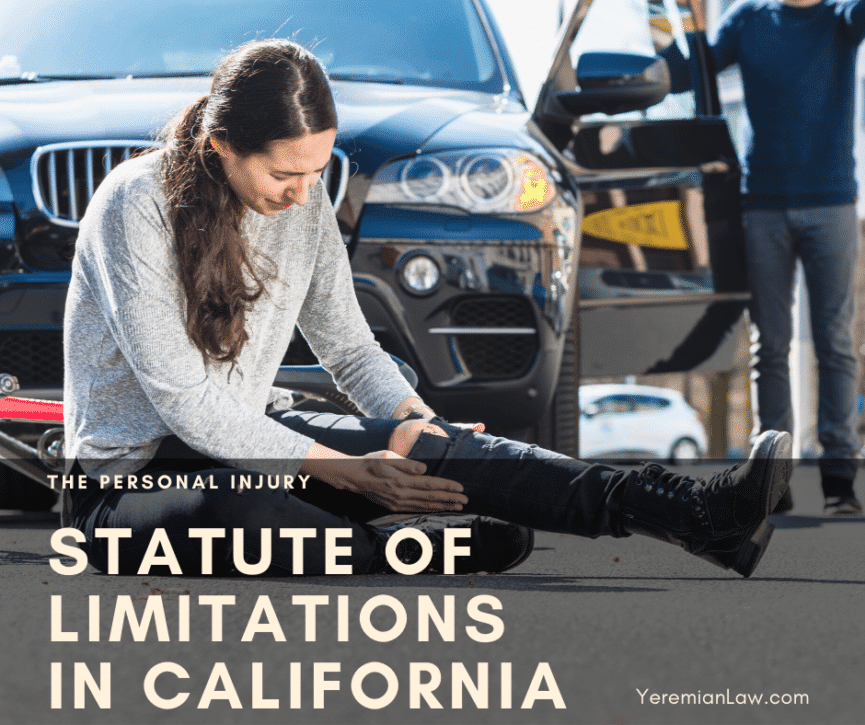The personal injury statute of limitations in California says you have two years from the date of your injury to go to court and file a lawsuit against the at-fault party. If you didn’t discover the injury right away, you have one year from the date the injury was discovered. The statute of limitations is very important in personal injury cases. Here’s what you need to know.
Why is the Personal Injury Statute of Limitations in California So Important?
If you attempt to file a lawsuit outside the statute of limitations, the courts won’t hear it. Likewise, if you try to negotiate a settlement with the at-fault party’s insurance company outside the law’s time frame, you’re unlikely to be successful – and that’s because the insurance company knows you can’t take them to court (because the statute of limitations has passed).
You will lose your right to seek damages for your injuries, no matter how severe they are, if you miss the filing deadline for the statute of limitations. That’s true even if it’s incredibly obvious that the defendant is responsible for your injuries.
Related: What is a product liability lawsuit?
The Two-Year Standard for the Personal Injury Statute of Limitations
 In California, you must file your personal injury lawsuit within two years or the courts will refuse to hear your case. However, there’s an exception: If you don’t discover the injury right away, you have a year from the date you discover the injury to file.
In California, you must file your personal injury lawsuit within two years or the courts will refuse to hear your case. However, there’s an exception: If you don’t discover the injury right away, you have a year from the date you discover the injury to file.
Many injuries don’t show up right away. For example, traumatic brain injuries are notorious for presenting symptoms long after the actual trauma occurred. You can even begin to experience symptoms like an inability to concentrate, headaches, blurry vision and difficulty remembering new information months after the injury. Sometimes soft tissue injuries don’t show up for a while, either.
Related: What is whiplash?
Exceptions to the Personal Injury Statute of Limitations in California
There are some exceptions that can mean you have more than two years to file your claim with the court. The first one, we’ve already mentioned – if you didn’t know you had an injury right away, you may be eligible to file a lawsuit up to a year after you discovered the injury. However, there are two more exceptions:
- The injured party was under the age of 18 when the injury occurred, or the injured person lacked the legal capacity to make decisions at the time of the accident.
- The person who allegedly caused the injury left California after the accident and before the injured party could file a lawsuit.

Negotiating a Settlement Within the Statute of Limitations for a Personal Injury Case
In order to negotiate a settlement, you must be within your statute of limitations. Otherwise, the party you’re trying to negotiate with will most likely refuse to try – and that’s because you won’t have any standing in court if you try to sue. The allegedly at-fault party won’t have the threat of a lawsuit to encourage them to negotiate.
If you are within the statute of limitations, your attorney may try to go back-and-forth with the at-fault party’s insurance company to negotiate a settlement that you feel is fair.
However, if negotiations fail – meaning that the insurance company refuses to pay out a fair amount – your attorney may suggest that you file a formal lawsuit in court.
Filing a Personal Injury Lawsuit in Court
If your case goes to trial, a judge will preside over it. The judge will ultimately decide how much – if any – compensation you deserve. The judge might award you compensatory damages, which are designed to compensate you for things like medical bills and lost wages, as well as punitive damages, which are designed to punish the at-fault party.
Do You Need to Talk to a Lawyer About the Personal Injury Statute of Limitations in California?
If you’ve been injured because of someone else’s negligence or carelessness, we may be able to help you recover the money you deserve. Call us at 818-230-8380 or fill out the form below for your free consultation. We can visit you in the hospital, at home or in our office to discuss your case – and remember, you only have a limited time to file, so the sooner you contact us, the better.




